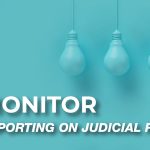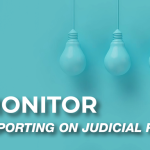
Number 2: Judicial Monitor – Monitoring and Reporting on Judicial Reforms
16/11/2024
N1.T2 – Ninth Attempt to Elect the President of the Supreme Court of Montenegro
20/11/2024N2.T4 – HRA Survey: One-Third of Judges and Prosecutors Perceive Corruption in the Judiciary
HRA NEWSLETTER 2 – TOPIC 4
According to a survey conducted by the NGO Human Rights Action in collaboration with DeFacto Consultancy, titled “Judicial Actors’ Perception of Corruption” approximately one-third of judges (33.7%) and nearly a third of state prosecutors (31.7%) believe that corruption exists within the Montenegrin judiciary. In contrast, the perception of corruption is significantly higher among legal practitioners, with 79.9% of attorneys and 63.1% of court experts indicating belief in the prevalence of corrupt practices in the courts and prosecutor’s offices.
The survey further revealed that nearly a third of judges (29.5%) and a quarter of state prosecutors (25.8%) have observed corruption within the judiciary over the past three years. This perception is even more pronounced among attorneys and court experts, with 69.7% of legal representatives and 35.8% of court experts acknowledging corruption incidents. Conversely, 46.3% of judges and 49.8% of prosecutors reported not witnessing any corruption within their ranks during the same period.
Conducted during the summer of 2024, the survey included 41 prosecutors (40.1%), 92 experts (43.8%), 95 judges (34.7%), and 109 lawyers (6.8%). Findings indicated that nearly half of the judges (48.5%) and a slightly lower percentage of prosecutors (43.9%) perceive a risk of corrupt practices within the career advancement system for judicial and prosecutorial professions.
At the presentation of the survey results, Tea Gorjanc Prelević, Director of the NGO Human Rights Action, underscored the validity of concerns regarding corruption and crime infiltrating the Montenegrin judiciary, noting that ten criminal proceedings have been initiated in recent years against former holders of high judicial and prosecutorial positions.
“The fact that a third of judges and almost a third of prosecutors acknowledge the existence of corruption is critical information that demands special attention and measures”, emphasized Gorjanc Prelević.
Judge Rade Ćetković, a member of the Judicial Council, stated that the data presented should serve as an alert for the judiciary.
“The Judicial Council must establish mechanisms to identify these issues and take decisive action to eliminate them. These cases must also be resolved in court”, Ćetković asserted, acknowledging that such significant changes cannot be accomplished swiftly.
The survey also indicated that only 22.1% of judges feel they are adequately compensated for their roles. In contrast, a significantly higher percentage of prosecutors (56.1%) express satisfaction with their salaries, while only a third of court experts share this sentiment.
Member of the Judicial Council, Miodrag Iličković, contends that a higher salary should not be the primary focus in efforts to enhance judges’ status.
“If the emphasis remains solely on salaries—an issue politicians often oversimplify, particularly the Prime Minister—the judges risk falling into a pit of their own making”, he remarked.
Zoran Radović, President of the High Court in Podgorica, echoed Iličković’s sentiment, asserting that the challenges within the judiciary cannot be resolved merely through salary increases.
“We must significantly improve working conditions, yet there’s uncertainty about when this will occur. Discussions surrounding the Special Court and the Palace of Justice are ongoing, but it may take years before tangible progress is realized”, Radović stated.
A component of the HRA survey addressed inappropriate pressures aimed at influencing judicial actions over the past three years. The findings indicated that 2.4% of state prosecutors and 5.3% of judges reported experiencing such pressure. Among attorneys and court experts, 11.9% and 8.7%, respectively, acknowledged similar pressures.
Furthermore, 61.5% of attorneys believe that certain judges accept bribes to influence their decisions. In contrast, only 17.4% of court experts, 9.5% of judges, and 7.3% of prosecutors shared this view. Nearly half (47.7%) of the surveyed attorneys, along with 14.1% of court experts and 7.4% of judges, suspect that specific state prosecutors accept bribes; however, no state prosecutors concurred with this assessment.
The survey also revealed that a majority of attorneys (61.4%), alongside 14.8% of judges and 14.6% of state prosecutors, believe that court experts engage in bribery. Among court experts, 16.3% agreed with this assertion. Additionally, over a third (36.7%) of surveyed members of the Bar Association of Montenegro believe that attorneys bribe certain judges and prosecutors.
While discussions regarding the introduction of vetting within Montenegro’s judicial system are underway, less than half of the surveyed judges (42.1%) and nearly a quarter of prosecutors (24.4%) support implementing phased vetting of judicial employees’ integrity. Conversely, a substantial majority of attorneys (72.5%) and court experts (66.3%) are in favor of this approach.
Notably, the HRA survey indicates that a significant number of judicial office holders are willing to assist in efforts to mitigate corruption and perceptions of corruption within the judiciary. Should vetting be implemented, 78% of prosecutors and 71.6% of judges expressed their readiness to undergo scrutiny.
Mladen Grdinić, President of the Commercial Court of Montenegro, stated his willingness to be among the first to undergo vetting. However, he cautioned against a phased implementation, emphasizing concerns regarding potential shortages of qualified personnel.
“If vetting leads to a significant departure of judges from the profession, we must reconsider that approach unless we are adequately prepared”, he warned.
The survey showed that only 7.3% of prosecutors and 3.2% of judges would resign in case of vetting.
Complete results of the survey are available at this link.
HRA NEWSLETTER 2
- N2.T1 – After four years, the Supreme Court of Montenegro finally has a President: Valentina Pavličić
- N2.T2 – Indictment Control Phase for Tunnel Dug Beneath High Court
- N2.T3 – Judges’ Strike Postponed as Negotiations with Authorities Progress
- N2.T4 – HRA Survey: One-Third of Judges and Prosecutors Perceive Corruption in the Judiciary
- N2.T5 – Judicial Council Confronts Politicians, Opens Sessions to the Public
- N2.T6 – Judicial and Prosecutorial Councils Incomplete; No Response from Political System Committee
- N2.T7 – Who Will Remain to Adjudicate in the Special Department of the High Court in Podgorica?
- N2.BN – BRIEF NEWS






 English
English